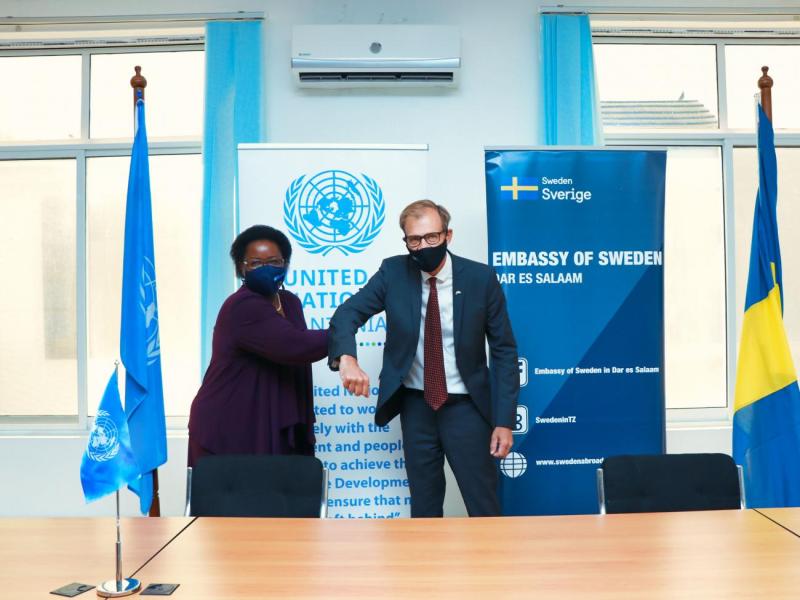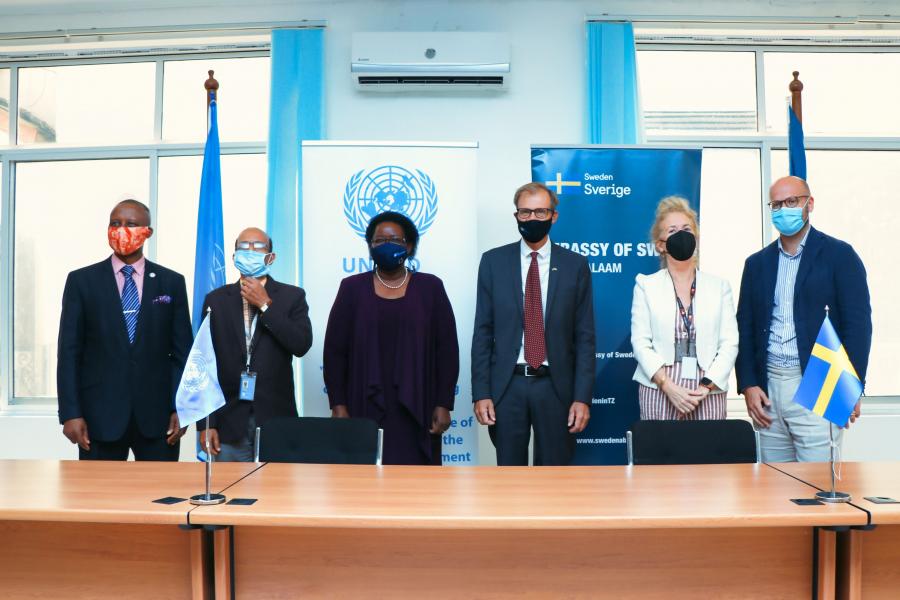

The Swedish Embassy in Tanzania has signed an agreement with the United Nations in Tanzania whereby Sweden contributes an additional USD 6.4 million
The Swedish Embassy in Tanzania has signed an agreement with the United Nations in Tanzania whereby Sweden contributes an additional USD 6.4 million (approx. Sh 14.8 billion) to support the continuation of UN development activities over the next year. The agreement, which was launched today by Ambassador of Sweden to Tanzania, H.E. Anders Sjöberg and Acting UN Resident Coordinator, Ms. Christine Musisi, will enable the UN to take forward its work for the social and economic development of women, children and youth, promotion of inclusive economic growth and employment, and strengthening democratic governance, human rights and gender equality in Tanzania.
With the latest contribution, Sweden’s overall support to the UN Tanzania under its current strategic document, the UN Development Assistance Plan II (2016-2022), is over USD 40 million. This generous support has been instrumental in enabling the UN to assist the governments on the mainland and Zanzibar at national and local levels to enhance policy and planning frameworks on a number of key developmental issues. It has also enabled the UN to support functioning of local businesses with viable and inclusive value chains generating employment, especially for women and young people, and ensuring their active and meaningful participation in the economy.

In partnership with the Government, UN agencies have been working to strengthen measures for improved accountability, transparency, and gender responsiveness, including access to justice and opportunities for citizen engagement. As a result of UN’s support, women and girls on both the mainland and in Zanzibar have benefitted from increased opportunities to hold leadership positions in political and public life at national and sub-national levels.
Through UN’s engagement with a range of partners in support to the five-year National Plan of Action to End Violence Against Women and Children (NPA), more women and children have access to and are better served by a national protection system that prevents and responds to all forms of violence and harmful practices. Multisectoral protection mechanisms are operational and are helping to address violence and protection needs at district, ward and village levels.
Highlighting Sweden’s commitment to Tanzania’s social and economic development, Ambassador Sjöberg said that Sweden has prioritized supporting UN activities that focus on the country’s development objectives in the areas of women’s rights, democratic governance and economic growth, leaving no one behind.
“For Sweden to ‘leave no one behind’ is both a prerequisite and a goal for inclusive sustainable development. Equality and inclusion are at the center of our development agenda. Sweden prioritizes strengthening the rights, representation, and access to resources for women and other vulnerable groups, because it is a vital component for building a growing, resilient, and democratic society,” he said.
Reiterating their continued support to Tanzania and the UN, Ambassador Sjöberg also reaffirmed Sweden’s commitment to the UN Secretary-General’s reforms and recognized the added value that UN agencies can bring to the table by working in a coordinated approach in close collaboration with the Government, development partners, and civil society.
Speaking on behalf of the UN system in Tanzania, Acting UN Resident Coordinator, Ms. Christine Musisi, thanked both the government and the people of Sweden for their sustained support. She pointed out that Sweden has been a dependable development partner for the UN and Tanzania.
“Sweden has been a strong partner of Tanzania and the UN for many decades. We thank them for their support which will enable UN agencies to continue working with the Government and other stakeholders in support of achieving national development priorities and the Sustainable Development Goals (SDGs),” she said.
Ms. Musisi added that, “This contribution will support the UN’s work across a broad range of areas such as promoting decent employment opportunities for Tanzanians, advancing good governance principles and women’s leadership in politics as well as preventing violence against women and children.”
Originally published on https://tanzania.un.org